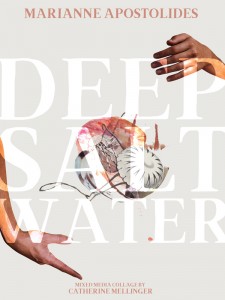Book Review
 The inimitable beauty in Marianne Apostolides’s memoir, Deep Salt Water (see recent interview with her here), rises out of its commitment to the metaphor. An elegy to our dying ocean and the aquatic life tethered to it, Deep Salt Water also examines the author’s emotional entanglement with a young lover, the abortion that comes after it, and the seventeen years in-between their first encounter and their last. Though it touches on both topics rather poignantly, Deep Salt Water is neither political nor didactic; rather, it is a text that transcends genre and uses the ocean and the life that exists within it as a lexicon for the necessary act of forgiveness.
The inimitable beauty in Marianne Apostolides’s memoir, Deep Salt Water (see recent interview with her here), rises out of its commitment to the metaphor. An elegy to our dying ocean and the aquatic life tethered to it, Deep Salt Water also examines the author’s emotional entanglement with a young lover, the abortion that comes after it, and the seventeen years in-between their first encounter and their last. Though it touches on both topics rather poignantly, Deep Salt Water is neither political nor didactic; rather, it is a text that transcends genre and uses the ocean and the life that exists within it as a lexicon for the necessary act of forgiveness.
At twenty-three, Marianne Apostolides is an eclectic spirit. Charmed by a man she meets at a conference, she engages in an affair that is fast, passionate, and ends when she flies back home, unaware of the residual impact their connection will come to bear on her life. Of their shared experience, she writes, “He taught me. Not oceans, but lifetimes.” Soon after their encounter, Apostolides learns she is pregnant and decides to abort the pregnancy, writing, “The decision was mine, though the baby was ours. It’s a quandary I haven’t been able to rest.” After the abortion, Apostolides begins to self-loathe, unwilling to forgive herself, believing pain is the only way to reach absolution: “We pass through stages. First is denial. Like zooming forward: leave it behind at the speed of suction. Then comes the punishment: self-flagellation, the guilt unabated. Infliction of pain is the only solution.” Years pass and Apostolides marries, has two children, writes five books, and divorces, while the memory of the affair and the abortion hovers in the backdrop like a watchful spirit. Her emotional decline is further exacerbated when she learns her former lover and his wife have experienced a slew of miscarriages, darkly coloring their marriage until its inevitable end. “Every visit to the bathroom: trepidation, expectation… Your wife’s blood was fresh and vivid; I scraped my inner in hopes of red. For both of us, you paced outside the door.” Though they lead largely separate lives, Apostolides and her former lover speak intermittently over time, only meeting again after seventeen years, two marriages, and endless attempts at forgiveness have passed.
In the background of this narrative, a second conversation unfolds, one that uses imagery from the ocean as the lens through which to talk about climate change. For each moment of personal chaos, such as her abortion experience, Apostolides threads details about marine life:
Fish will sleep . . . amidst vegetation; inside of a sponge, or buried in sand. For us, it’s rows of medical beds. I’m placed in the third row. The women around me don’t seem to notice: they’re lacking engagement with the outside world. They’re not ‘awake,’ but we can’t call it ‘sleep.’ It’s the amniotic bliss of amnesia.
The book’s emotional strength lies in the marriage of these two narratives. The weaving of Apostolides’s personal pain with the metaphoric pain of the ocean allows the reader to enter the world of the text through various points of empathy. Language and structure work tirelessly to satisfy this marriage. Through her lyricism, Apostolides is able to undercut the book’s darker moments, creating a layered sensory experience that sometimes borders on the abstract. In her search for forgiveness, Apostolides unpacks words and studies their etymologies, seeing herself in their fact, myth, and history:
Still seeking forgiveness, I find the word ‘amnesty’—‘a pardon for offenses committed.’ It shares its stem with the word ‘amnesia.’ Forgiveness, it seems, requires forgetting. But when we remove the prefix ‘a’—a denoting ‘lack’—a-mnesia reveals the goddess ‘Mnemosyne,’ Mother of Muses, whose name arises from ‘mindful’ and ‘memory’.
It is difficult to ignore Apostolides’s very purposeful attempt to create a text that is as multilayered as it is multimodal. Divided into three parts and then further divvied into thirty-seven episodic chapters, the book is symbiotic of a woman’s pregnancy, with the three parts representing trimesters and the thirty-seven chapters representing the average number of weeks of pregnancy. A borderless map of sorts, this structure offers the reader the route with which to navigate, and better understand, the inherent complexity of a woman’s body.
Dancing the line between poetry and prose, Deep Salt Water is an imaginative expression of all the human body shares with the earth it inhabits. With Deep Salt Water, Apostolides has written a book that doubles as healing salve for the things inside us begging for compassion.
About the Reviewer
María Isabel Alvarez received her MFA in fiction from Arizona State University. Her short fiction and book reviews have appeared or are forthcoming in Gulf Coast, Black Warrior Review, Sonora Review, Puerto del Sol, Arts & Letters, New Orleans Review, and Prairie Schooner, among others. She has received grants and scholarships from the Arizona Commission on the Arts, the Tennessee Arts Commission, Sundress Academy for the Arts, and Hedgebrook.